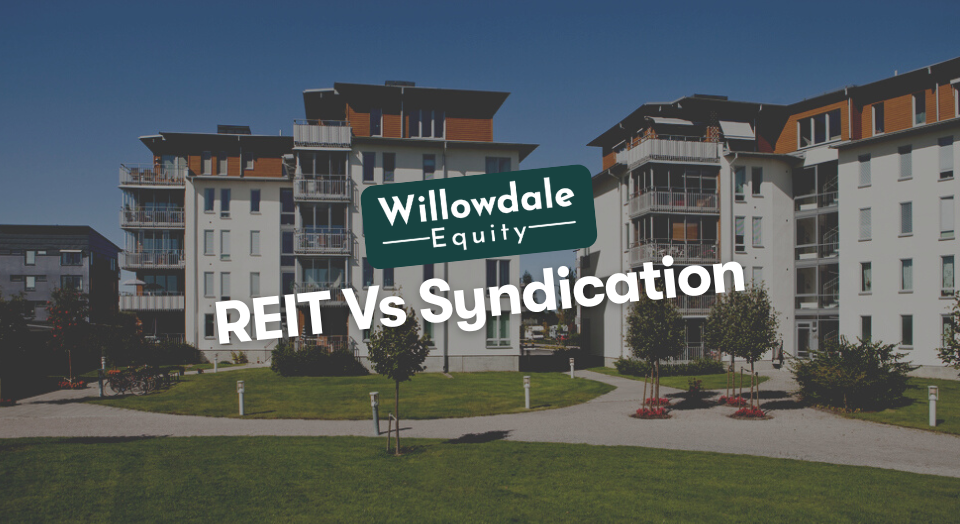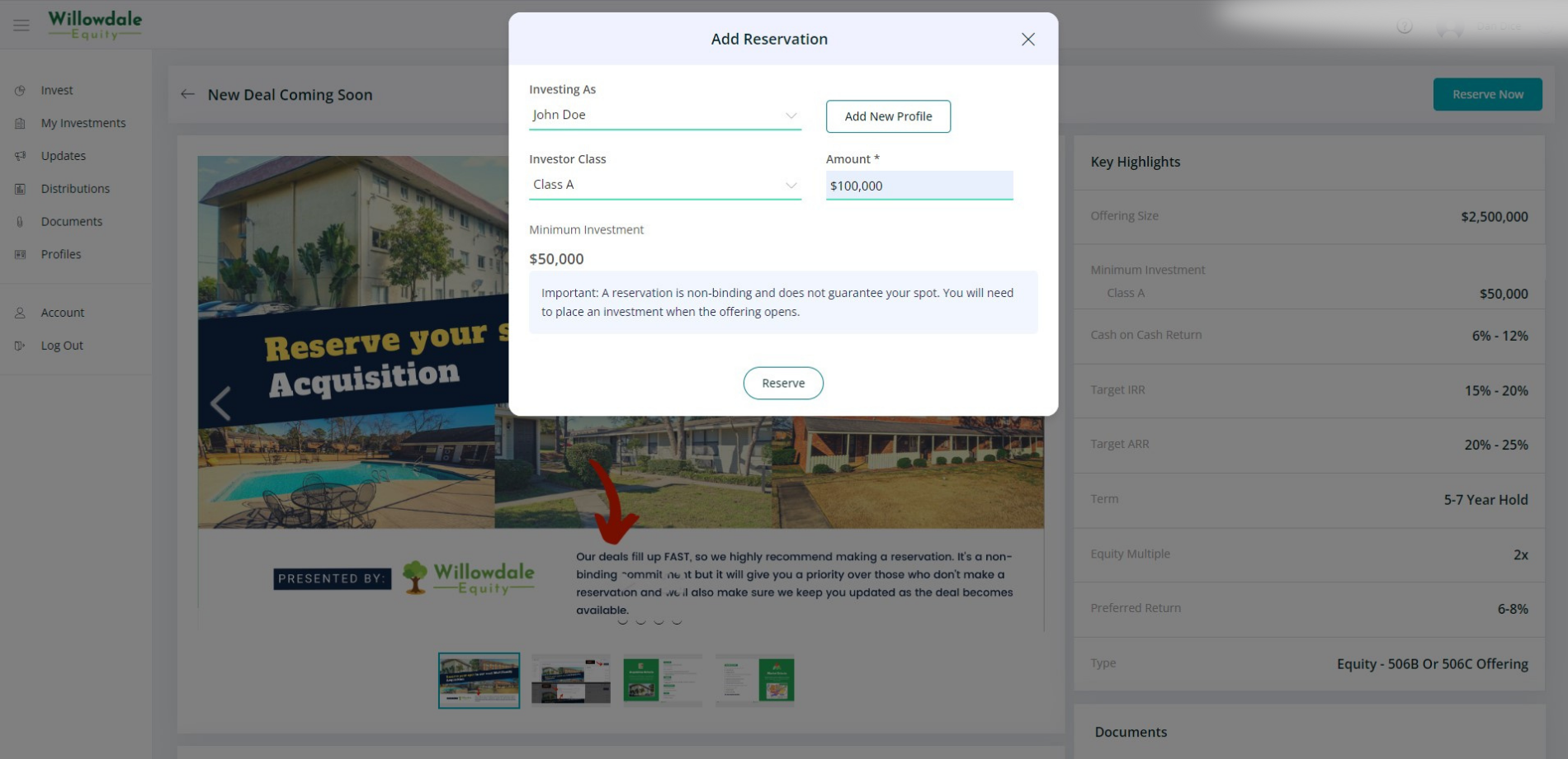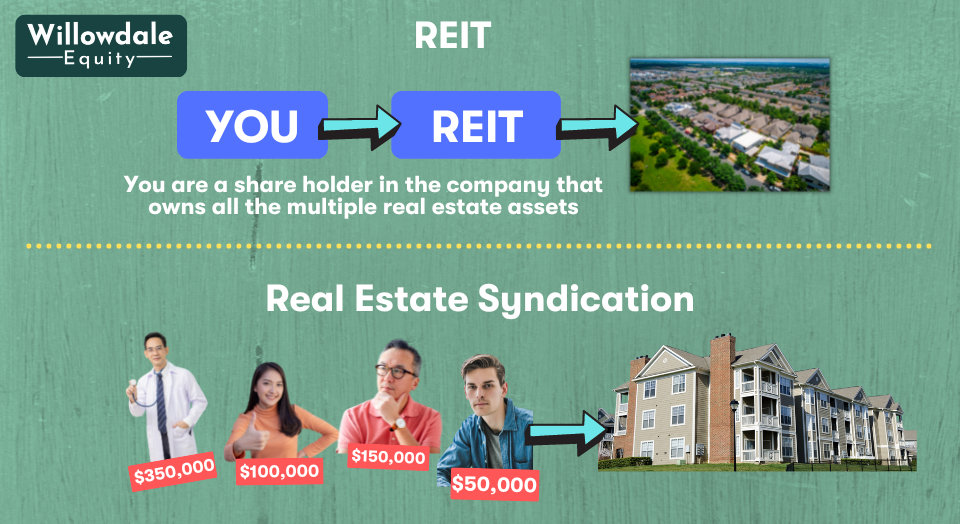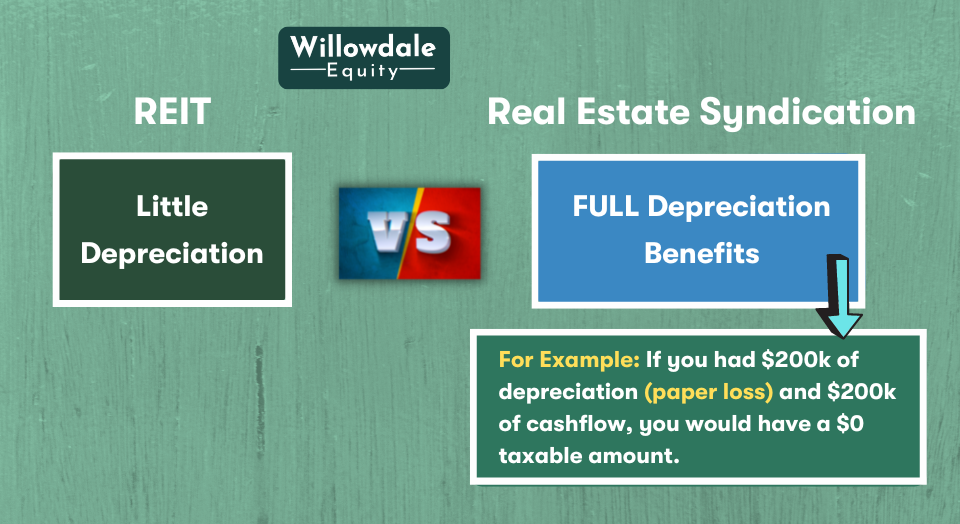
REIT Vs Syndication: What’s The Difference Between The Two?
This article is part of our passive investors guide on real estate syndications, available here.
Even though the majority of your time is spent on a daily basis working, it will not hinder you from growing an investment portfolio and gaining exposure to positive cash flow from commercial real estate investments. Owning 100% of the property and taking calls from angry renters whose air conditioner went out in the middle of the night doesn’t have to be your experience in real estate investing. Some people may enjoy actively operating their real estate portfolio and may have more time to handle their properties on the side, but it’s not appealing to everyone.
That’s where Investment vehicles like real estate syndications, real estate investment trusts (REITs), crowdfunding platforms, and joint ventures (JV), to name a few, give you that option. That implies you can invest as an LP and get the same advantages without dealing with the responsibilities.
The two main ways to passively invest are through a REIT or a real estate syndication. Most people are likely familiar with a REIT as many are publicly traded on the stock market and allow low barriers to entry. But what’s the difference between a REIT and a real estate syndication? What are the advantages and disadvantages?
We’ll go more in-depth in this guide.
Key Takeaways
-
The investors in a REIT do not acquire title to the firm’s real estate assets but have a stake in the company’s stock.
-
Several parties are involved in a syndication, including real estate brokers, property managers, CPAs, lenders, attorneys, passive investors (you), and the syndicator who puts it all together and operates the project.
-
Real estate syndications have minimum investment requirements; typically, while REITs investment minimums are much lower. Like any stock on the stock market, you can invest as little as just a few bucks, unlike in a real estate syndication.
What is a REIT
A REIT, or real estate investment trust, is a firm that owns income-producing real estate assets. The investors in a REIT do not acquire title to the firm’s real estate assets but have a stake in the company’s stock. REITs have been around since the 1960s, and their main attractiveness comes from their liquidity and easy access for investors to get diversification in income-producing real estate assets.
Generally, there are two types of REITs that investors can invest in the first is are equity REITs and the second is mortgage REITs. Hence “equity,” the first type of REIT, owns income-producing real estate assets, while mortgage REITs issue loans to real estate buyers and refinance loans.
What is Real Estate Syndication

A real estate syndication is a helpful technique for investors to combine their resources to acquire more considerable real estate assets they could not manage or afford as individual buyers, generally by purchasing it with additional capital from outside investors and then forcing appreciation, as well as actively managing the asset.
In many deals, 25%-30% of the funds are pooled together from the syndicator and the passive investors, and 70-75% of the money comes from the lender/bank. Several parties are involved in a syndication, including real estate brokers, property managers, CPAs, lenders, attorneys, passive investors (you), and the syndicator who puts it all together and operates the project (Willowdale Equity).
Related Read: Property Fund vs. REIT: What’s the Difference?
7 Main differences of Real Estate Syndication vs REIT
Below are the seven main differences between passive real estate investing in a real estate syndication vs. REIT (real estate investment trust).
- Direct Ownership
- Value Volatility
- Tax Benefits
- Diversification
- Barriers to Entry
- Investment Minimums
- Liquidity
Let’s explore the differences together.
1.) Direct Ownership:
When you invest in a REIT, you don’t technically own the real estate assets that the company holds; instead, you own a percentage of shares in the company’s stock. When you invest in a syndication, you gain direct ownership through being a limited partner (LP) in the limited liability company (LLC). Being a direct property owner gives you access to all the exciting tax benefits that only direct ownership will get you. We’ll go into more detail on this in the next section.
2.) Value Volatility:
Syndicated real estate investments are not investment vehicles that are publicly traded and therefore are not priced to market on a daily basis. The stock price of equity REITs can vary widely from one month to the next. It is frustrating for investors who want more certainty about what they’re getting into before buying shares in a particular company.
While REITs may have high dividend returns, their publicly traded shares are subject to a significant degree of price volatility, an event less likely to occur with private real estate syndication. The illiquidity of privately held real estate helps investors hold and preserve their real estate portfolio values due to investors being unable to quickly liquidate or sell their real estate assets when there’s any bear news or current economic event. Stocks, for example, are subject to this price volatility because investors can quickly sell off in a panic and easily move on to the next shiny object.
3.) Tax Benefits:
One of the main advantages of investing in a real estate syndication vs a REIT is the tax advantages that come with it. As a direct investor (through a syndication), you get to take part in the full depreciation or paper loss of the property, as opposed to the very limited depreciation you get with investing in a REIT.
Depreciation is essentially the decline of an asset’s value over time (on paper), even though the actual value continues to appreciate. The depreciation loss you can write off in an apartment building is often more (or close to it) than the cash flow the building produces. That means the taxable amount on that cash flow could be $0 or close to it. Furthermore, having direct ownership may allow you to qualify for real estate professional status. If you meet the IRS’s qualifications to be considered a “real estate professional,” you could even apply your paper loss to your active income to further reduce your personal tax liability.
4.) Diversification:
Syndications are typically single property acquisitions where funds are raised to purchase an individual asset, giving investors more control over the specific assets they are investing in. REITs offer diversification, as when you buy shares in a REIT, your investment is spread across multiple assets that the REIT owns.
Some like the idea of this level of diversification, and others are uncomfortable with the over-diversification that a REIT offers. It all comes down to your investment goals, comfort level, and confidence in the operators of the real estate assets that you’re getting behind.
5.) Barriers to Entry:
The access to passive real estate investment opportunities is not created equal. For syndications, the sponsor of a deal is not always allowed to market the investment opportunity per SEC guidelines. Also, many syndications require the passive investor to be a verified accredited investor and have some prior relationship with the sponsor group. Accredited investors meet the guidelines and requirements of income and net worth based on the Securities and Exchange Commission (SEC) regulations.
This is so that the SEC can ensure proper protection for all investors. Since most REITs are traded in the public markets, this would enable you to invest within minutes.
6.) Investment Minimums:
The investment minimums required to invest in a REIT are much lower. Like any stock on the stock market, you can invest as little as just a few bucks, unlike in a real estate syndication. Real estate syndications have minimum investment requirements; typically, that number ranges anywhere from $25,000-$100,000, depending on the sponsor of the deal and what the offering entails. But generally, the starting investment amount for a real estate syndication is $50,000.
7.) Liquidity:

REITs are highly liquid investments, similar to investing in any publicly-traded company on any of the major stock exchanges. Due to the stock market having a large volume of buyers and sellers at any given time during regular trading hours, your shares in a REIT can be potentially sold within a day. Real estate syndications are less liquid as your invested dollars will sit in the project for the duration of the targeted hold. Investors in a syndication can receive as much as all their capital back in the project’s first three years if the business plan is executed correctly.
The Illiquidity of real estate also helps hold the value of the property and your investment, as it takes time, resources, and capital to exit a real estate deal. This forces real estate investors to think and hold their investments longer term, reducing more significant swings in value, unlike the stock market.
How to invest in real estate syndication?

It’s crucial to grasp the fundamentals of basic passive real estate investing before going into a real estate syndication. In addition, it’s critical to learn how a multifamily real estate syndication works.
Next, if you don’t already know, you need to find out if you’re an accredited investor, which you can do by reading our article titled “Am I an Accredited, Non-Accredited Or a Sophisticated investor? Accredited investors usually get access to more private investment opportunities due to their accreditation status, which is a direct result of the strict rules that the SEC imposes on real estate sponsors.
Lastly, you need to choose a real estate sponsor you know, like, and trust. It doesn’t mean you have to invest with one sponsor; you can diversify your capital by spreading your risk across multiple sponsor groups.
Frequently Asked Questions About Reit Vs Syndication
A REIT and a real estate syndication are often confused because both investment vehicles offer passive investment opportunities in real estate. Most retail investors can invest in most REITs, while not all investors may be eligible to invest in a real estate syndication. Some qualifications need to be met by investors depending on the particular investment offering.
REITs or real estate investment trusts are not bad investments by any means, but when compared to a real estate syndication, it falls short in many categories. The main reason it falls short is that you don’t get one of the biggest benefits of owning a real estate portfolio: the tax advantages that only come with direct ownership in real property. This is something you get through a real estate syndication, as each investor in a syndication owns interest via direct shares in the LLC.
Real estate syndications are an excellent way for investors to pool their capital together to buy more significant properties that give investors better economies of scale with less risk.
Real Estate Syndication vs REIT - Conclusion
Willowdale Equity offers select commercial real estate investors private multifamily real estate investment opportunities to earn passive income as a limited partner (LP). Multifamily is the most robust asset class, allowing investors to achieve positive cash flow on day 1. We spend weeks and months digging into a market, negotiating a deal, and executing that vision to properly hit our targets.
We appreciate the process and would love to offer you the opportunity to build long-term wealth through cash-flowing commercial real estate investing. Join our private investor club today to access our exclusive investments and further continue your multifamily real estate education.
The Willowdale Equity Investment Club is a private group of investors that are looking to passively grow their capital and share in all the tax benefits through multifamily real estate investments.








